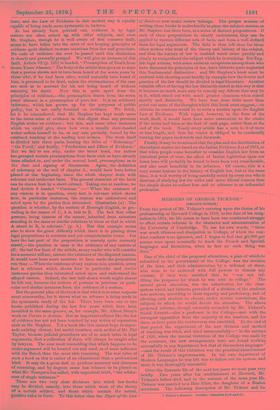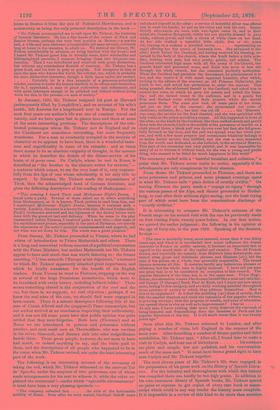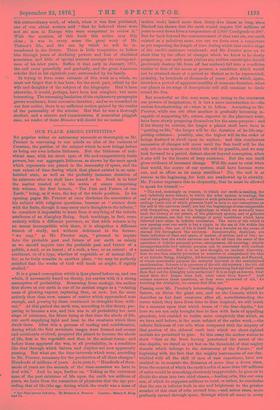MEMOIRS OF GEORGE TICKNOR.*
(SWARD NOTIOE.1
FROM the period of Mr. Ticknor's entering upon the duties of his professorship at Harvard College in 1819, to the date of his resig- nation in 1834, his life seems to have been one continued struggle to effect certain reforms in the character and administration of the University of Cambridge. To use his own words, "there was much idleness and dissipation in College, of which the resi- dent teachers were ignorant, and I began to feel that $2,000 per annum were spent nominally to teach the French and Spanish languages and literatures, when in fact no such thing was done."
One of the chief of the proposed alterations, a plan of which he submitted to the government of the College, was the revision of the laws, and their administration by a tribunal of three, who were to be endowed with full powers to dismiss any student, if they were satisfied that he " was not ful- filling the purposes for which he was sent to college." The second great alteration, was the substitution for the class- system which had hitherto prevailed of a division of the students into sections, according to their capacity and proficiency, and of allowing each student to choose, under certain restrictions, the subjects to which he would devote his attention. The above proposed reforms, though earnestly seconded by Mr. Ticknor's friend Everett—also a professor in the College—met with the strongest opposition from the majority of the teachers, and for three or four years the controversy was unsettled, At the end of that period the experiment of the new division and method of teaching was tried, and tried unsuccessfully—" in the autumn of 1826, when the annual visitation of the College was made by the overseers, the new arrangements were not found working successfully in any department but that of the modern languages " —and the result of this visitation was the practical abandonment of Mr. Ticknor's improvements. In his own department of Modern Languages he was left free to follow out his system, and there it was thoroughly successful.
Over the domestic life of the next ten years we must pass very briefly. Two years after his establishment at Harvard, Mr. Ticknor's father died, and in the autumn of the same year Mr. Ticknor was married to a Miss Eliot, the daughter of a Boston .merchant. The following description of Mr. Ticknor and his
* Moor's Memoirs. London : Sampson Low and 0o:
home in Boston is from the pen of Nathaniel Hawthorne, and is noteworthy as being the only personal description in the book :— " Mr. Folsom accompanied me to call upon Mr. Ticknor, the historian of Spanish literature. He has a fine house at the coiner of Park and Beacon Streets, perhaps the very best position in Boston,—a marble hall, a wide and easy staircase, a respectable old man-servant, evidently long at home in the mansion, to admit us. We entered the library, Mr. Folsom considerably in advance, as being familiar with the house; and I heard Mr. Ticknor greet him in friendly tones, their scholarlike and bibliographical pursuits, I suppose, bringing them into frequent con- junction. Then I was introduced and received with great distinction, but without any ostentatious flourish of courtesy. Mr. Ticknor has a great head, and his hair is gray or grayish. You recognise in him at once the man who knows the world, the scholar, too, which is probably his more distinctive character, though a little more under the surface.
Certainly he is a fine example of a generous-principled scholar, anxious to assist the human intellect in its efforts and researches. He is, I apprehend, a man of great cultivation and refinement, and with quite substance enough to be polished and refined without being worn too thin in the process,—a man of society."
In January, 1835, Mr. Ticknor resigned his post at Harvard (subsequently filled by Longfellow), and on account of his wife's health, left America for a lengthened tour in Europe. For the next four years our author's life was one of constant travel and variety, and we have space but to glance here and there at some of the more interesting portions. The descriptions of the cele- brated personages whom Mr. Ticknor met in England and on the Continent are sometimes interesting, but more frequently wearisome. For a man so constantly occupied in the analysis of character as he appears to have been, there is a wonderful tame- ness and superficiality in some of his remarks and at times there seems to be an absolute vulgarity of thought, in the manner in which he describes the details of the dinner-service of his hosts, et id genus omne. Dr. Carlyle, whom he met in Rome, is described as " the brother to the obscure writer for reviews,"— a sentence which comes, to say the very least of it, very ungrace- fully from the lips of one whose scholarship is his only title to respect. In Dresden, Mr. Ticknor made the acquaintance of Tieck, then the acknowledged bead of German literature, and gives the following description of his reading of Shakespeare :-
" This evening I heard Tieck read Midsummer Night's Dream. I found quite a party. Several of them asked me to select something from Shakespeare, as it is known, Tieck prefers to read from him, and I mentioned Midsummer Night's Dream, because it contains such a variety. Luckily, the piece is a favourite with him. He read it admirably. Puck's frolicsome mischief and the lightness of the dainty fairies were done with the greatest tact and delicacy. When he came to the play represented before Theseus, I received quite a new idea,—that some of the repetitions and groans, especially in the part of Pyramus, are merely the expression of the actor's personal embarrassment and anguish, and not what was set down for him. The whole was a great pleasure."
From Saxony, Mr. Ticknor proceeded to Vienna, where be had etters of introduction to Prince Metternich and others. There is a long and somewhat tedious account of a political conversation with the Prime Minister, but neither Metternich nor Mr. Ticknor appear to have said much that was worth listening to ; the former asserting, " L'etat actuel de l'Europe m'est degofitant," a sentence to which Mr. Ticknor apparently attached great importance, and which he kindly translates, for the benefit of his English readers. From Vienna he went to Florence, stopping on the way at several of the large Dominican monasteries, which seem to be furnished with every luxury, including billiard-tables ! There seems something absurd in the conjunction of the cowl and the cue, but there is, we suppose, no real objection ; perhaps, if we knew the real state of the case, we should find nuns engaged in lawn-tennis. There is a minute description following this of the case of Count Alberti and the (supposed) Tasso manuscripts, but our author arrived at no conclusion respecting their authenticity, and it was not till some years later that public opinion was quite settled that they were forgeries. Both here (Florence) and at Rome we are introduced to princes and princesses without number, and such small men as Thorwaldsen, who was careless in his attire, Sismondi, and Bunsen sink into utter insignificance beside them. These great people, however, do not seem to have had much, or indeed anything to say, and the visits paid to them, and the descriptions of all people who happened to be in the room when Mr. Ticknor arrived, are quite the least interesting part of the work.
The following is an interesting account of the ceremony of taking the veil, which Mr. Ticknor witnessed at the convent Tor de' Specchi, under the auspices of two princesses, one of whom made arrangements for his seat to witness it, while the other ex- plained the ceremonial !—under which "agreeable circumstances" it must have been a very pleasing spectacle :—
" The company collected fast, the elite of the fashionable nobility of Rome. Soon after we were seated, Cardinal Galan came and placed himself at the altar; a service of beautiful silver was offered him to wash his bands; ho put on his robes and took his seat. Imme- diately afterwards six nuns with wax-lights came in, and in their midst the Countess Bolognetti, richly but not showily dressed in pure white, without jewels, and with a crown of white roses on her head. At her side walked a beautiful little child, five or six years old, bearing on a cushion a jewelled crown representing an angel offering her the crown of heavenly love. She advanced to the altar, knelt before the Cardinal, and having received his blessing, re- turned to the body of the church, where she knelt before a little prie- dieu, looking very pale, but very pretty, gentle, and solemn. The Cardinal celebrated high mass with all the pomp of his Church, the guards knelt and presented arms, and there was more or less stir through the whole church, but she remained perfectly motionless. When the Cardinal had partaken the Sacrament, ho administered it to her, and she received it with much apparent humility, after which, turning to the abbess of the convent, an old Princess Pallavicini, she knelt to her, and asked her permission to enter the convent. This being granted, she addressed herself to the Cardinal, and asked him to receive her vows, to which he gave his assent, and added his bless- ing; and she turned round to the audience, and in a gentle but firm and distinct voice solicited their prayers while she should pronounce them. The nuns now took off some parts of her dress, and put on that of the convent ; she pronounced her vows of obedience, seclusion, &c.; her hair was cut off the Miserere ' was sung, the service for the dead chanted, and she was sprinkled with holy water as the priest sprinkles a corpse. All this happened in front of the altar, as she knelt by the Cardinal. She then walked slowly and gently down into the church, knelt in the middle of the pavement of marble on a cloth placed there, a black pall was thrown over her feet, she fell grace- fully forward on her face, and the pall was spread over her whole per- son, and with a few more prayers and ceremonies whatever belongs to an entire burial service was fulfilled, and she rose a nun, separated from the world, and dedicated, as she believed, to the service of Heaven. This part of the ceremony was very painful, and it was impossible for many of us to witness it without tears, for she was a young and gentle thing, who seemed to be fitted for much happiness in this world."
The ceremony ended with a "tasteful breakfast and collation," a point that Mr. Ticknor never omits to notice, especially if the refreshments are only conspicuous by their absence.
From Rome Mr Ticknor proceeded to Florence, and there are more princesses and princes, and more pleasant evenings spent in what Mr. Ticknor calls " plain duties of courtly civility." On leaving Florence the party made a " voyage en zigzag" through the various passes of the Alps, and thence proceeded to Heidel- berg, to rest after their arduous sight-seeing, not the least trying part of which must have been the conscientious discharge of " courtly civilities."
It is interesting to compare Mr. Ticknor's estimate of the French stage on his second visit with the one he previously made on first visiting Paris, twenty years before. In our first notice, we quoted the earlier judgment ; the following is his opinion at the age of forty-six, in the year 1838. Speaking of the theatres, he says :—
"The tone is decidedly lower, more immoral, worse than it was thirty years ago, and when it is recollected how much influence the drama exercises in France on public opinion, it becomes an important fact in regard to the moral state of the capital and country. The old French drama, and especially the comedy, from Moliere's time downwards, con- tained often gross and indelicate phrases and illusions [sic], but the tone of the pieces, as a whole, was generally respectable. The recent theatre reverses all this. It contains hardly any indecorous phrases or allusions, but the whole tone is highly immoral. I have not yet seen one piece that is to be considered an exception to this remark. The popular literature of the time, too, is in the same tone. Victor Hugo, Balcac, the shameless woman who dresses herself like a man and calls her- self George [? Georges] Sand, Paul do Koch, and I know not how many more, belong to this category, and are daily working mischief throughout those portions of society to which they address themselves. How is this to be explained ? Is it that the middling [sic] class of society, that fills the smaller theatres and reads the romances of the popular writers, is growing corrupt ; that the progress of wealth, and even of education, has opened doors to vice as well as to improvement ? I fear so At any rate, I know nothing that more truly deserves the reproach of being immoral and demoralising than the theatres of Paris and the popular literature of the day. It is all much worse than it was twenty years ago."
Soon after this Mr. Ticknor returned to London, and after paying a number of visits, left England in the summer of the same year. After describing a number of dinner-parties and titled notabilities, Mr. Ticknor says, " After all, I found time to make a visit to Carlyle, and hear one of his lectures his manners are plain and simple, but not polished, and his conversation much of the same sort." It must have beena grand sight to have seen Carlyle and Mr. Ticknor together.
The next eleven years of Mr. Ticknor's life were engaged in the preparation of his great work on the History of Spanish Litera- ture. For the industry and thoroughness with which this history was compiled there can hardly be too high praise. In addition to his own enormous library of Spanish books, Mr. Ticknor spared no pains or expense to get copies of every rare book or manu- script which could in any way render the history more complete.
It is impossible in a review of this kind to do more than mention this extraordinary work, of which, when it was first published, one of our ablest writers said "that he believed there were not six men in Europe who were competent to review it." With the mention of this book this notice may fitly close ; it was in every sense the great work of Mr. Ticknor's life, and the one by which he will be re- membered in the future. There is little temptation to follow him through years of declining powers and loss of cherished associates, and little of special interest amongst the correspond- ence of his later years. Suffice it that early in January, 1871, the end came peacefully and gradually, and the great American scholar died in his eightieth year, surrounded by his family.
• In trying to form some estimate of this work as a whole, we must not forget that it has been, for the most part, edited by the wife and daughter of the subject of the biography. Had it been otherwise, it would, perhaps, have been less complete, but more interesting. The unceasing laudation of the explanatory paragraphs grows wearisome, from excessive iteration ; and as we remarked in our first notice, there is no sufficient notion gained by the reader of the personality of the scholar. But that he was a thorough student, and a sincere and conscientious, if somewhat priggish man, no reader of these Memoirs will doubt for an instant.
































 Previous page
Previous page